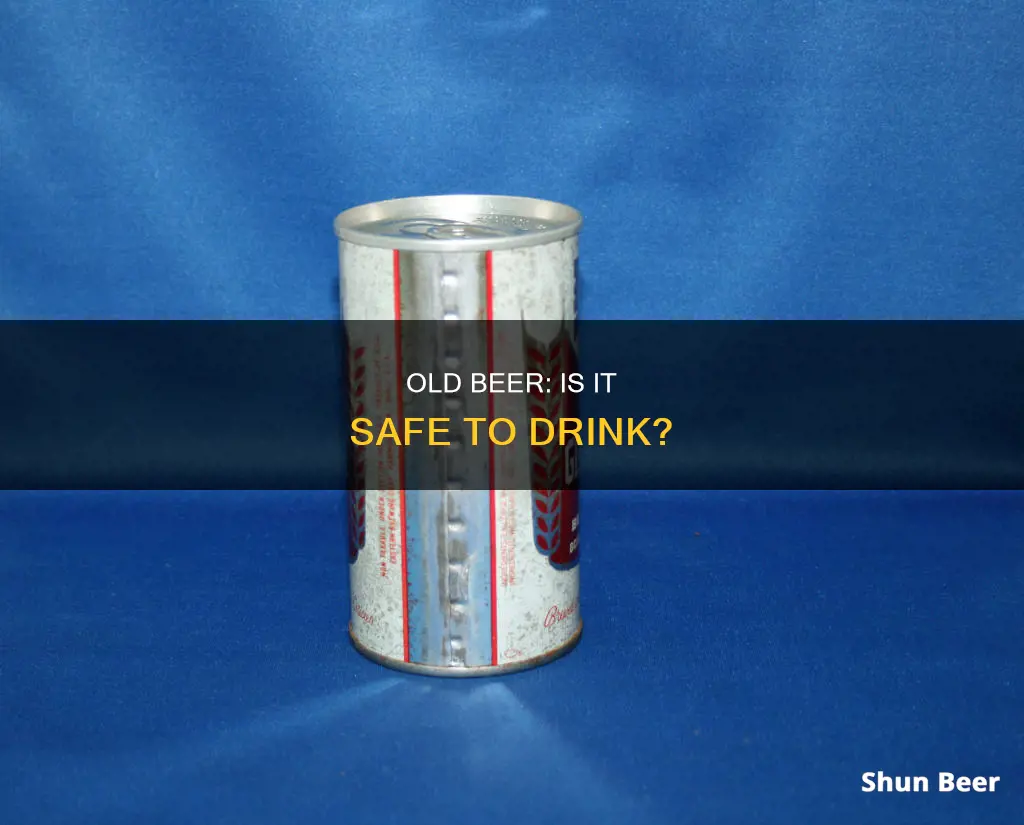
Beer is a perishable product that can be sensitive to light, oxygen, and heat, which can affect its taste and quality. However, it is generally safe to drink old beer, and it won't make you sick. Beer doesn't expire in the same way that other foods and drinks do, due to its alcohol content and the presence of hops, which have antimicrobial properties that prevent pathogenic growth. While it's best to drink beer as fresh as possible, particularly hop-heavy styles like IPAs, it is unlikely to be dangerous to drink old beer.
| Characteristics | Values |
|---|---|
| Is it safe to drink old beer? | Yes, but it may not taste very nice. |
| Why does beer taste bad when it's old? | Beer is affected by light, oxygen, and heat, which degrade the organic compounds that make beer smell and taste great. |
| What does old beer taste like? | Old beer can taste like "wet cardboard", overly sweet, or skunky. |
| What should I do if I find an old beer? | Check if it's lost its fizz or has a vinegary taste. If so, throw it out. |
| How can I prevent my beer from going bad? | Keep it in a cool, dark place, preferably a refrigerator. |
What You'll Learn

Beer doesn't expire like milk
However, while it's safe to drink, old beer will taste different. The oxygen inside the bottle, can, or keg changes the beer through oxidation, which is responsible for a range of flavours. Some beers will develop a stale, cardboard-like flavour, while others can become sweet, bready, or even toffee-like. Beers with a high ABV, such as barley wines and imperial stouts, are sometimes brewed with aging in mind and can improve with age.
The biggest threat to the taste of beer is light, specifically ultraviolet light, which causes a chemical reaction that produces a compound with a distinct skunky flavour. Beer bottles are often tinted brown to protect against this, and cans are also effective at blocking out light. Heat is another factor that can cause beer to spoil, as it speeds up the oxidation process.
Beer and Suboxone: What's the Deal?
You may want to see also

It's safe to drink old beer
It's generally safe to drink old beer. While it's best to consume beer as fresh as possible, as it can go "bad" over time, it's unlikely to make you sick. Beer doesn't expire in the same way that other foods and drinks do.
Beer Expiration
Beer doesn't expire in the same way that milk does, for example. While old beer may taste bad, it won't make you sick. Beer has a \"best before\" date, not an expiration date. This means that it is safe to consume beyond this date, but the quality and taste may deteriorate.
Factors Affecting Beer Quality
There are several factors that can cause beer to spoil or "skunk": light, oxygen, heat, and time. Hops are sensitive to UV radiation, so exposure to sunlight can cause a chemical reaction, resulting in a distinct skunky flavor. Even a short period of exposure to sunlight can cause this reaction.
Oxidation can also negatively impact the taste of beer. All beer contains a small amount of oxygen, and oxidation causes a change in the aroma and flavour compounds, resulting in a papery taste. Heat speeds up oxidation, so it's important to store beer in a cool, dark place, preferably a refrigerator.
Beer Storage
To maintain the freshness and quality of beer, it is recommended to store it in a cool, dark place, such as a refrigerator. If stored at room temperature, ensure it is kept out of direct sunlight. Storing beer upright also helps to reduce exposure to oxygen.
Beer Styles and Aging
Different styles of beer have varying shelf lives. Hoppy beers, such as IPAs, are best enjoyed fresh, as the delicate hop aromas and flavours dissipate over time. On the other hand, bottle-conditioned beers with a higher ABV (9% or higher) can improve with age. Barley wines and imperial stouts are sometimes brewed with the intention of being aged for a couple of years.
Beer Drinking Post-Gastric Sleeve: What You Need to Know
You may want to see also

Beer tastes worse as it gets older
There are several factors that contribute to the degradation of beer's taste over time. The main culprits are light, oxygen, heat, and time. Hops, a key ingredient in beer, are sensitive to UV radiation from the sun. Exposure to sunlight, even for under an hour, can cause a chemical reaction that produces 3-methyl crotyl mercaptan, resulting in a distinct skunky flavour. Hence, most beer bottles are tinted brown, and modern beer cans help prevent "lightstrike".
Oxidation also negatively affects the taste of beer. Oxygen interacts with the compounds from malt, yeast, and hops, causing oxidation and a disappointing papery or cardboard-like taste. Heat accelerates oxidation, so storing beer at room temperature or exposing it to repeated temperature fluctuations can hasten the deterioration of its flavour.
Additionally, the delicate characteristics of beer, such as the volatile aromas from hops, dissipate over time. This is especially noticeable in hop-heavy styles like IPAs. The bright, floral, and citrusy notes that make these beers appealing tend to fade within a few months, leaving a dull and muted version of their former selves.
While some beers, like barley wines and imperial stouts, are occasionally brewed with aging in mind, the general recommendation is to drink beer as fresh as possible. To prolong the shelf life of your beer, store it in a cool, dark place, preferably a refrigerator. If you must store it at room temperature, ensure it is not exposed to sunlight, and keep the bottles or cans standing upright to minimise oxygen exposure.
Drinking Non-Alcoholic Beer While on Plavix: Is It Safe?
You may want to see also

Beer is resistant to spoiling
Beer is resistant to spoilage due to several factors. Its high ethanol content, low pH, high carbon dioxide concentration, and low oxygen content all contribute to making it a challenging environment for microorganisms to survive in. In addition, the bitter compounds found in hops have antibacterial properties, specifically against Gram-positive bacteria. These factors combined make beer a relatively stable product that can last for years when stored properly.
However, it's important to note that beer can still spoil, and certain factors can accelerate this process. Exposure to oxygen, heat, and light can cause flavours to deteriorate and create an environment that promotes the growth of spoilage organisms. Oxygen, in particular, interacts with the compounds from malt, yeast, and hops, causing oxidation and a papery taste. Heat speeds up oxidation, and light can cause a chemical reaction, resulting in an unpleasant skunky taste. Therefore, it is recommended to store beer in a cool, dark place, preferably in a refrigerator, and to consume it as close to its "born on" date as possible.
Additionally, while most microorganisms cannot survive in beer, some have adapted to flourish in this environment. These beer-spoiling organisms can be categorised as obligate, potential, or indirect contaminants. Obligate contaminants, such as Lactobacillus and Pediococcus, are always spoilage organisms and can cause sour or buttery flavours, respectively. Potential contaminants only grow under certain conditions, such as low alcohol or light hops, while indirect contaminants contaminate the raw materials used in brewing.
In summary, while beer is resistant to spoilage due to its inherent characteristics and the presence of hops, it is not completely impervious to spoilage. Proper storage and consumption within recommended time frames are crucial to maintaining the quality and flavour of beer.
Beer and Zyrtec: A Safe Mix?
You may want to see also

Beer is best stored in a cool, dark place
Oxygen can also negatively impact beer, causing oxidation, which results in a cardboard-like aftertaste. While modern brewing techniques have reduced the amount of oxygen that makes it into beer cans and bottles, it is still an issue. Once a beer is opened, oxidation accelerates, so it's best to finish the beer in one sitting.
Heat speeds up oxidation, so storing beer at room temperature is not recommended. Major temperature changes, such as going from an ice-cold cooler to a hot car, can also negatively impact beer.
If you don't have space in your refrigerator, the next best place to store beer is in a cool basement or cellar, ensuring that the area is as dark as possible.
Drinking NA Beer in the Car: Is it Legal?
You may want to see also
Frequently asked questions
Yes, it is safe to drink old beer. Beer doesn't expire in the same way that other foods and drinks do. The fermentation process, low pH level, and alcohol content make it difficult for microorganisms to survive.
The taste of old beer can change over time. It may become flat, overly sweet, or develop a vinegary taste.
To keep your beer fresh, store it in a cool, dark place, preferably a refrigerator. If you're storing it at room temperature, ensure it is not exposed to sunlight.
If the seal is broken, or you notice mould, it's best to throw it out. Otherwise, it's safe to drink, but the taste may have changed.







